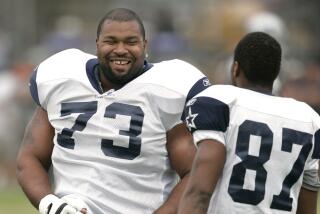Learning His Lesson the Hard Way : Rancho Alamitos’ Allen Finds That Academic Skills as Well as Athletic Ability Are Needed for a Scholarship
- Share via
GARDEN GROVE — The letters for Kevin Allen began piling up in Rancho Alamitos football Coach Doug Case’s office last fall, about the time Allen was streaking past defenses during the Southern Section playoffs.
The letters kept coming in the spring and summer. Even last week, Case received seven more from Pacific 10 and Big Eight schools. But the letters might as well be addressed to Santa Claus, because now they are serving only as mementos.
Painful mementos.
Allen, a 5-foot-9, 165-pound running back/receiver, is one of the county’s more talented and electrifying players. Unfortunately, his football skills haven’t much helped in the classroom, where Allen is so far behind in his core requirements for college that he has stopped trying to catch up.
“Kevin’s main problem is application,” Case said. “Obviously, he’s a heavily recruited player, but he doesn’t have the grades for Division I football. I think he knows the handwriting is on the wall. I think he knows he’s going to continue his career at a junior college.”
Even if he were on pace to finish his core classes, Allen would be stopped in his tracks by the Scholastic Aptitude Test, one of two standardized tests used by the NCAA to determine athletic eligibility.
While most college-bound seniors already have taken the test, Allen has yet to schedule it.
“I’m kind of scared and nervous to take the SAT because I know that I haven’t studied for it,” Allen said. “I don’t want to know the results, because I know I’m not ready for it.”
Allen, who has rushed for 349 yards and five touchdowns this season, acknowledges he is not ready for much of anything, except perhaps a football career. He has coasted through high school, hoping for handouts that never came.
“As I got into high school, I just thought that I could come in and play ball and the teachers would just hand me my grades,” Allen said. “But it doesn’t work like that. You have to strive hard for the grades.”
Allen may have learned his hardest lesson in Case’s history class.
“I thought since he was my coach he would give me just a little slack, but it didn’t work like that,” Allen said. “He was harder on me because I was a ballplayer and he knows that I had a chance to get a scholarship. But he also knows that you have to put in the effort. I really wasn’t working that hard in his class.”
So Case gave Allen the grade he thought the student earned, a “D”.
“He didn’t do any of his work,” Case said. “I wasn’t going to gift him the grade.”
If it wasn’t for an “A” in a summer school body shop class, Allen would not have been eligible to play his senior season. The “A” raised Allen’s grade-point average to exactly 2.0, the minimum requirement for eligibility.
And what if Allen had not been able to play this season, or last season, or ever? Would it have affected his academic career?
“I’d be a better student because I wouldn’t have to think about the next game and the next opponent,” Allen said. “All the stress about playing this position, that position. . . . But that’s really just an excuse. I guess it’s my fault that I’m not getting the grades I should be getting. I just blame it on myself.”
Case said the three hours a day football players spend on the practice field and in the weight and film rooms doesn’t help academic performance, but it doesn’t prevent someone from excelling in the classroom either.
“There are only so many hours in a day, but you can always find time to study,” Case said. “They just need to schedule their study time better. I just think if people apply themselves better, they achieve more.
”. . . We don’t ask an impossible task of students in high school. I don’t believe in osmosis. You can’t put the book under the pillow and suddenly wake up smart.”
Allen agrees.
“If a student that doesn’t play football can do the work, why can’t a student that plays football do it?” he said. “I don’t think it’s that hard on the student. I just don’t study that often. I know that I could do the work, but I just don’t.”
It has been hard for Allen at home, where he lives with his grandfather and his older brother. Allen’s father moved out when he was 3 and his mother moved to San Diego last year.
“My mom pushed me every day,” Allen said. “She’d ask me where my books were and if my homework was done. My grandpa is a little slack, but he still asks me, ‘Where’s your homework? Did you do it?’ Of course I’m going to say yes, but sometimes I don’t really do it.”
Though he still talks to his mother, Allen said he rarely lets anybody else in on his problems at school.
“I just don’t talk to people about things like that,” he said. “I just seem to keep that stuff to myself.”
If anyone has tried to fill Allen’s father’s shoes, it’s Case, who has constantly reminded his star running back/receiver to keep up with his classes.
“I hear lectures every day from Coach, but it just seems like it goes in one ear and out the other,” Allen said. “I’m starting to listen and do my work.”
But Allen knows he started listening too late.
“It’s kind of frustrating because I know I’m good enough to go to a good college,” he said. “The only thing holding me back is my grades and maybe my size. I just wish I could have my freshman year back so I could start from the beginning.”
Case hopes his freshmen are listening.
“I want to get them early to make sure they get their core done,” Case said. “They fall behind so early.”
Kevin Allen is their example.
More to Read
Get our high school sports newsletter
Prep Rally is devoted to the SoCal high school sports experience, bringing you scores, stories and a behind-the-scenes look at what makes prep sports so popular.
You may occasionally receive promotional content from the Los Angeles Times.






